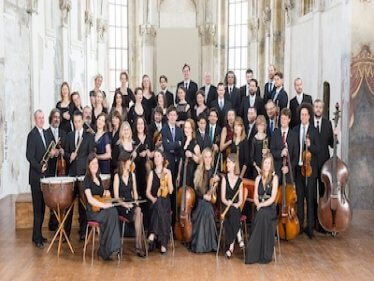Les Boréades - Schedule, Program & Tickets
Les Boréades
Tragédie lyrique in five acts (1763)
Music by Jean-Philippe Rameau
Libretto by Louis de Cahusac
Concert performance in French
An opera for meteorological friends: Alphise, Queen of Bactria, is a prisoner of her office, for she is only allowed to marry one man from the family of the god of the north wind, Boreas, but she has fallen in love with Abaris, an orphan of unknown origin , For him, she even renounces the crown. This does not help her: her two candidates, Borileas and Calisis, sons of Boreas, are in dispute over the vacant throne, after all, God intervenes Boreas himself. He devastated Bactria with a bad weather and abducted Alphise to his cold realm, where he wanted to torture her with bad weather until she chose one of his sons as his spouse. He underestimated his no-name opponent Abaris. Apollo brings Abaris to Boreas' kingdom and with the magic arrow of love, a gift from Alphise, he repulses all henchmen of Boreas and frees his beloved. In the end it turns out that Abaris is a son of Apollo and his mother is a nymph of the Boreaden family. HappyEnd, because that is how the rules of mythological aristocracy and love are satisfied. Les Boréades is the last work of Jean-Philippe Rameau, it was never performed in his lifetime, it was only on stage in 1982 in Aix -en- Provence. Preparations began in April 1763, but after two rehearsals, the Royal Amusement Office canceled everything. Why, is not clear to this day. The music shows Rameau at the height of his art, he confidently handles the form of the Tragédie lyrique with its excellent arias, lively choirs and many virtuoso ballet music. The instrumentation is original and colorful, in the realm of the north wind Rameau unleashes wild storms in the orchestra. Perhaps the royal censors have looked at the work only after rehearsal, because there are explosive Enlightenment thoughts in it: A queen who renounced her love for a stranger to their power, this decides independently and does not care about noble marriage rules, was possibly for unable to cope with the ancien régime. About the second act is significant: "It is the freedom that we must love, she is the supreme god."
Subject to change.
Music by Jean-Philippe Rameau
Libretto by Louis de Cahusac
Concert performance in French
An opera for meteorological friends: Alphise, Queen of Bactria, is a prisoner of her office, for she is only allowed to marry one man from the family of the god of the north wind, Boreas, but she has fallen in love with Abaris, an orphan of unknown origin , For him, she even renounces the crown. This does not help her: her two candidates, Borileas and Calisis, sons of Boreas, are in dispute over the vacant throne, after all, God intervenes Boreas himself. He devastated Bactria with a bad weather and abducted Alphise to his cold realm, where he wanted to torture her with bad weather until she chose one of his sons as his spouse. He underestimated his no-name opponent Abaris. Apollo brings Abaris to Boreas' kingdom and with the magic arrow of love, a gift from Alphise, he repulses all henchmen of Boreas and frees his beloved. In the end it turns out that Abaris is a son of Apollo and his mother is a nymph of the Boreaden family. HappyEnd, because that is how the rules of mythological aristocracy and love are satisfied. Les Boréades is the last work of Jean-Philippe Rameau, it was never performed in his lifetime, it was only on stage in 1982 in Aix -en- Provence. Preparations began in April 1763, but after two rehearsals, the Royal Amusement Office canceled everything. Why, is not clear to this day. The music shows Rameau at the height of his art, he confidently handles the form of the Tragédie lyrique with its excellent arias, lively choirs and many virtuoso ballet music. The instrumentation is original and colorful, in the realm of the north wind Rameau unleashes wild storms in the orchestra. Perhaps the royal censors have looked at the work only after rehearsal, because there are explosive Enlightenment thoughts in it: A queen who renounced her love for a stranger to their power, this decides independently and does not care about noble marriage rules, was possibly for unable to cope with the ancien régime. About the second act is significant: "It is the freedom that we must love, she is the supreme god."
Subject to change.
There are no products matching the selection.






